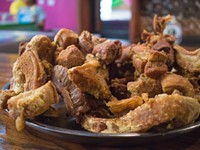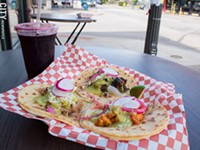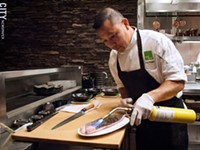[
{
"name": "500x250 Ad",
"insertPoint": "5",
"component": "15667920",
"parentWrapperClass": "",
"requiredCountToDisplay": "1"
}
]
Refugee-run restaurants enhance Rochester's palate
Rochester is a city of refugees. They come from Syria, Cuba, Somalia, Iraq, Afghanistan, the Republic of Congo, Bhutan, Burma, Nepal, and elsewhere. In 2016, almost 1,200 new refugees arrived in Rochester, up from more than 750 people in 2015.
There are as many reasons to leave home as there are problems in the world — people are forced to flee war, genocide, political oppression, natural disasters, lack of viable opportunities, and other devastations. Whatever the cause, refugees usually arrive with few material possessions, but carry with them a wealth of culture. And when they plant roots, some individuals gather the necessary ingredients to manifest and share a taste of home.
The following refugees have set up shop in Rochester, offering traditional food — at times with multicultural twists — to their fellow refugee communities, as well as Americans who benefit from the ever increasing flavors.
Just like mama made
Natael Beshaat came to Rochester from Ethiopia in 2002 on a Diversity Visa. The Diversity Immigrant Visa Program is a lottery for citizens of countries that have low immigration rates to the United States. Up to 50,000 visas are given out annually through the program, and Beshaat had the golden ticket.
Beshaat is the owner of Zemeta Ethiopian Restaurant (1015 South Clinton Avenue), but his affiliation with the restaurant actually started 13 years prior to him taking ownership.
Beshaat came from Addis Ababa, the capital city in Ethiopia, to Rochester because his sponsor was based here. Back home he owned a barbershop.
"I didn't have any friends, I didn't have any family" in Rochester, Beshaat says.
He got a job as a dishwasher in the old restaurant where Zemeta is currently housed, and stayed with his sponsor for a few months before moving into a shared apartment. Later, he left the dishwashing behind for a better job opportunity.
"After a year I was able to move into my own apartment, living the American life," he says with a laugh. It was in that apartment that Beshaat would cook traditional Ethiopian food for his American friends.
Beshaat opened UN Café and Hookah Lounge upstairs from where Zemeta currently is, and a store replaced the restaurant where he washed dishes. He started making food at the café, available only for take-out.
"People started talking to me, 'Why don't you open your own restaurant? This is tasty food and the neighborhood needs someone like you,'" Beshaat says.
Owning his own restaurant was always something he'd considered, so when the store moved out of the space below his café, Beshaat opened Zemeta.
"The neighborhood provided a lot of support," he says.
The restaurant is named for his wife, who works alongside him in the kitchen, cooking traditional Ethiopian food.
"We serve food to people here just the way we cook back home," he says.
Zemeta has a popular vegan buffet on Fridays and Saturdays, with a full menu also available with beef, chicken, and lamb entrees. The food is served with the traditional Ethiopian bread, injera, a spongy, sour, flatbread.
Making injera in the Rochester climate can be tricky, especially when the cold weather hits. There's a fermentation process that happens while making the bread, which has to be perfectly room temperature to come out right.
Ethiopian food is typically centered on lentils, chickpeas, or yellow split peas, with the addition of traditional spices, garlic, and onions. The yesimmirwet dish combines split lentils with garlic, onions, and canola oil and is finished with a hot pepper sauce called berbere. Dishes can be made with varied degrees of spice.
Beshaat's parents owned a small restaurant back home and recently came for an extended visit to Rochester, spent time with their two grandchildren, and checked out the restaurant their son had opened.
"It was an inspection to see how I made the food," Beshaat says.
His mother headed right to the kitchen and made everything the way that she makes it — showing Beshaat some tips along the way.
In addition to the restaurant, Beshaat is still operating the café and hookah lounge upstairs and serving high test Ethiopian coffee. The beans are imported from Ethiopia. "We roast the coffee here, we grind it, we use our traditional clay pot, we boil it — we make everything like it's made back home," Beshaat says.
The café also sells traditional spices, for those looking to start experimenting with Ethiopian cooking at home.
As for his experience in the United States, Beshaat loves it here. "Like they say, it's a dream," he says. "Your dream here can be anything. I was a dishwasher — a little guy —and now it's the same building, the same place, I'm the owner. I can't believe this. I wouldn't be able to do this back home."
Zemeta Ethiopian Restaurant is open Monday through Saturday from 11 a.m. to 9 p.m. The buffet is available on Fridays and Saturdays all day. For more information, call 244-3344 or find them on Facebook.
The international hub
When Abdirisak Salat Urur left his hometown of Mogadishu in 1991, Somalia was in the beginning throes of a civil war that is still raging today. Like so many others, Urur and his family fled the war-begotten violence, famine, and disease in pursuit of safety and security. It was an indirect path that led Urur to Rochester, where he arrived in 2015 and opened Somali African Cuisine (480 West Main Street).
In late 1991,Urur journeyed to a refugee camp in Kenya, the country where his three children were born, and which would become his new home until 2007 — the year that the Somali refugee count hit 1 million. At that time, his family relocated to the U.S., arriving in Kansas, Missouri.
Despite horror and hardship, or perhaps because of it, Urur speaks of this period of time with the calmest demeanor, and seems like an unsinkable kind of man.
"When you've never been to a country with another culture, having children with you, having nothing, you feel vulnerable and weak," he says. "At the same time, you feel happy when people open their hands for you, be there for you, as well as your family trying to help you with whatever they can."
Urur says the community in Missouri helped his family start fresh.
"America is a wonderful country, with wonderful people," he says. "I'm almost 60 years old, and I have seen different people on this earth, but Americans are very generous people."
He says that his children initially experienced culture shock at school when they witnessed how unruly American kids can be. "In Africa, we treat the teachers like second parents," he says.
Two of his children are grown — his daughter is in medical school and one son works in IT — and his youngest son graduates from high school this year. Though Urur moved to Rochester about two years ago, his family is still in Missouri, because he didn't want to uproot his son.
"It's better to be where he started and made friends and is comfortable," he says.
Urur moved to town after he learned from Rochester-based friends that there is a Somali refugee population here, some of whom had been in Rochester for 20 years and didn't know there was a community.
"They were isolated, and didn't have a place to see each other, to chill together, to chat," he says. "And there was no traditional restaurant where they could get food from back home. So I said, 'Let me try.'"
Most of Urur's customers are refugees, and his small, cozy restaurant serves as a gathering place for not just Somalis, but also refugees from Sudan, Eastern African and Arab nations, and from Pakistan. One corner of the room can get a little rowdy whenever there is a soccer game playing on the television.
The menu includes tender, curried goat meat or curried chicken with rice; hummus; suqaar (finely diced, sautéed meat) with a sourdough anjero pancake; sambusas (crispy, flakey triangle pastries stuffed with lamb and spices); and American dishes including chicken wings, a fried fish sandwich, and chicken and Philly steak wraps.
"We also have an Italian dish, because Somalia was colonized by the Italians," Urur says. "Most of our food has some Italian influence, like the spaghetti, which our people like a lot," he says with a laugh.
And there it is, on the wall-mounted menu behind the counter: a plate of thick spaghetti noodles and red sauce.
Somali African Cuisine is open daily from 9 a.m. to 10 p.m. For more information, call 413-0441.
Halal hots spot
Serkan Yagmur, owner of West Ridge Hots (584 West Ridge Road), was just 17 years old when his family moved from Turkey to the United States in 2002. He was still in school when his father applied for the green card lottery through the Diversity Immigrant Visa Program.
The Yagmur family relocated from Çorum, a city in central Turkey located about 150 miles from the nation's capital, Ankara. Although Turkey has undergone some serious strife in recent years — President Recep Tayyip Erdoan's administration survived a failed coup in July, and most recently has conducted violent crackdowns on dissenters and free expression — the Yagmurs weren't fleeing a particular danger at the time of their emigration. They left in pursuit of better opportunities in the U.S.
"It was a good opportunity for me and my family," he says, adding that they still return to Turkey to visit extended family.
Yagmur says that he always liked the idea of working in the food business, but he hadn't chosen a career path when his family relocated. "I didn't have a plan of what I was going to do there, and then we came here, and started over," he says.
The Yagmurs initially landed in New York City before coming to Rochester. A contact hosted the family in his house for a month while Yagmur's parents acquired jobs, and he took English classes at Franklin High School with other international students while he worked part-time.
"We couldn't get an apartment on the other side of the city because we didn't have credit," he says.
After years of working and adapting to life in the States, Yagmur became an American citizen in 2008. Before he opened West Ridge Hots in 2013, Yagmur worked at different restaurants to gain food service experience, including East Ridge Hots and Di Paolo Baking Company. The hots restaurant in particular influenced his decision to open one, but Yagmur offers some important variations on the Rochester standard.
The menu is filled with what you might expect from a hots joint: all-American burgers, dogs, and fries, subs, wings, and wraps. But Yagmuralso offers halal options (the meat is entirely free of pork; and animals are slaughtered, by a Muslim, following methods set by Islamic law) for his Muslim customers.
These menu items include chicken shish kabobs and a variety of gyro dishes, each served with rice pilaf, salad, and pita bread; a chicken shawarma dinner, characterized by chicken marinated in garlic, lemon juice, cumin, paprika, turmeric, and cinnamon; and even a cheeseburger plate made with halal meat.
The menu also includes a few vegetarian options of salads and baked potatoes with different toppings. And in addition to fountain beverages, West Ridge Hots also offers made-to-order fruit smoothies in a variety of flavors.
Because the restaurant is open late every night — until 2 a.m. on weekdays and 4 a.m. on weekends — and offers online ordering and delivery, Yagmur's customer base includes a lot of college students, and particularly international students seeking the halal food.
"There are jobs that people can work just 8 hour shifts," Yagmur says, "but when it's your own business, you work your longer hours. The benefit is that you don't have a boss, you're on your own. It's good and exciting," he says.
Yagmur employs six other people, including his sister and brother-in-law, and his father occasionally helps out. He says plans to open a second location by the end of the summer, and offer more vegetarian and Mediterranean dishes as well.
Located just inside the front door of the restaurant is a rack filled with the kinds of pamphlets you'd see in rest stops or tourist offices. This little library not only provides bite-sized tours of our region's wealth of natural sights and culture, but serves as a reminder to those of us who are from here to be grateful for what we've got.
West Ridge Hots is open Sunday through Thursday from 11 a.m. to 2 a.m. and Friday to Saturday from 11 a.m. to 4 a.m. For more information, call 287-5661 or visit westridgehots.com.
In This Guide...
Speaking of...
-

Cuomo loosens capacity restrictions on restaurants
Mar 8, 2021 -

Support black-owned restaurants
Jun 2, 2020 -

International food round-up
Aug 28, 2019 - More »
Latest in Dish
More by Rebecca Rafferty
-

Beyond folklore
Apr 4, 2024 -

Partnership perks: Public Provisions @ Flour City Bread
Feb 24, 2024 -

Raison d’Art
Feb 19, 2024 - More »
More by Katie Libby
-

Chow Hound: Blades
Sep 14, 2018 -

Chow Hound: Neno's food truck gets brick-and-mortar
Aug 31, 2018 -

Chow Hound: Omakase at Next Door Bar & Grill
Aug 20, 2018 - More »












